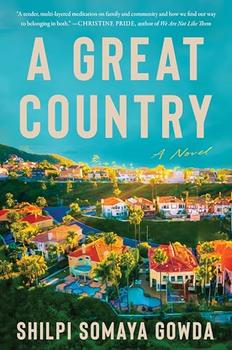Book Club Discussion Questions
In a book club? Subscribe to our Book Club Newsletter and get our best book club books of 2025!
Please be aware that this discussion guide will contain spoilers!
- Consider the title and how it works with the story. Why do you think the author, Shilpi Somaya Gowda, chose it?
- Did you find yourself torn about how to feel about any of the characters' reactions or decisions? What moments were particularly controversial to you, and how did they challenge your perceptions? Were there parts of A Great Country that made you uncomfortable? Why?
- Did the alternating perspectives of each character highlight any important similarities or differences about their experiences and how they move through the world? Did you come away with a better understanding of any one character in particular?
- Vikram says: "No one willingly gives up their place of privilege for someone new." How is this statement proven or disproven by different characters throughout the novel? How accurate do you think this sentiment is in reflecting society?
- How does including the perspectives of police officers, including that of Officer Diaz and Sergeant O'Reilly affect the story? How did this affect your views on the issue of police violence?
- Priya and Ashok struggle with the decisions that they've made about their children and their ability to protect them. Deepa struggles with reconciling her parents' sacrifices with the society in which she was raised, Maya struggles with fitting in—in more ways than one.
How does family influence your decisions? How has your own family influenced your decisions?
- Deepa covers for Maya when she skips school, and Maya is highly attuned to Ajay's idiosyncrasies. What do you think of the Shah sibling relationship? What are your relationships like with your siblings or sibling-type people around you?
- Compare Deepa's friendship with Paco to Maya's with Ashley. Where does each friendship stand by the end of the novel? What do you think would happen between them over more time?
- Food is important to the Shah family, as well as others in their lives. How is food and cuisine used at different points to demonstrate the emotions of the characters or the state of their relationships?
- Jonathan Stern and Helen Wu briefly provide accounts of their families' different experiences with immigration to the United States. How do they compare to the Shahs' story?
- When Jonathan Stern tells the Shahs to play into the "model minority" myth because they are "well integrated into American society," what is he really asking of them? If the Shahs agree to this narrative of the assimilated immigrant family, do you think they are giving up a part of their culture or identity? What would you do in their situation?
- What did you think about the friendships among the adult women? Which relationships feel genuine, and which are transactional? In what ways do these characters express affection or loyalty? How do you support a friend in a crisis? How has a friend supported you?
- How does Ajay's potential neurodivergence complicate his treatment by the police and his recovery from trauma? How do you think his story's outcomes might have changed if his parents had pursued an earlier diagnosis?
- In what ways do Ashok and Priya cope differently with their family's crisis? Which response do you think would be closer to your own way of dealing with a similar situation?
- Early on, Vikram suggests that money and assets are as effective as weapons for protection. Do you agree with this philosophy? In which ways does the Shahs' recently accumulated wealth protect them? In which ways does it fail them?
- The novel highlights how various differences—in race, socioeconomic class, citizenship, neurodiversity, caste—can be used to divide people and discriminate against them. Which of these kinds of discrimination have you encountered in your own life experience? Did any of the differences depicted in the novel surprise you or challenge your assumptions?
- Imagine it's a year after the novel's conclusion. What do you think each of the characters might be doing at that time? How might the events of the novel continue to have repercussions for them?
Book Club Kit
Unless otherwise stated, this discussion guide is reprinted with the permission of Mariner Books.
Any page references refer to a USA edition of the book, usually the trade paperback version, and may vary in other editions.
